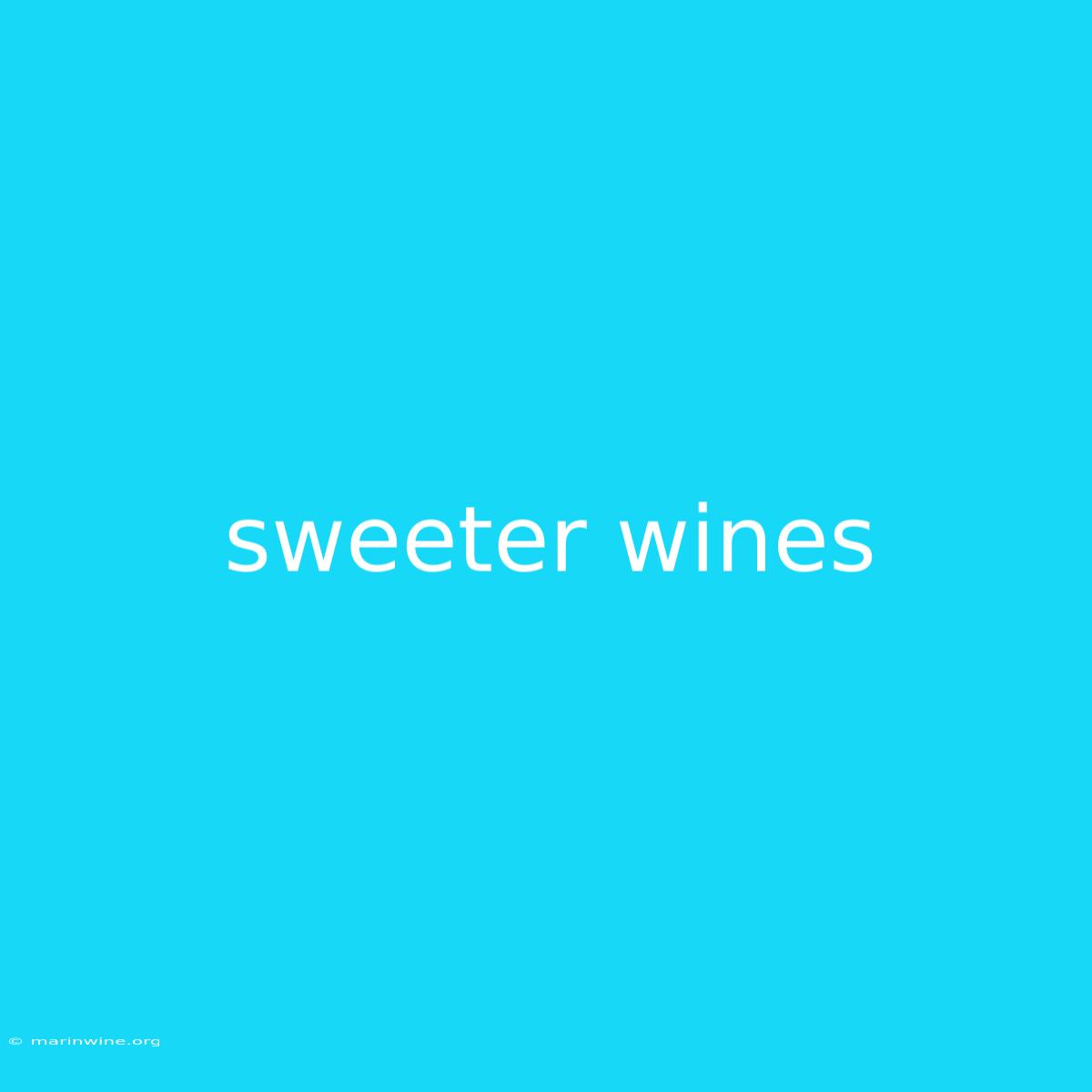Unlocking the Sweetness: A Guide to Sweeter Wines
Have you ever wondered what makes some wines taste sweet, while others are dry? The answer lies in the residual sugar content left behind after fermentation. This article will explore the fascinating world of sweeter wines, offering insights into their characteristics, styles, and how to enjoy them best.
Why It Matters: Sweeter wines offer a delightful alternative to dry wines, captivating with their luscious flavors and enjoyable versatility. Understanding the various styles and their origins will empower you to navigate the world of sweeter wines with confidence, discovering new favorites along the way.
Key Takeaways:
| Feature | Description |
|---|---|
| Residual Sugar: The amount of sugar remaining after fermentation determines a wine's sweetness. | |
| Styles: Sweeter wines span a wide range, from slightly off-dry to intensely sweet dessert wines. | |
| Pairing: Sweet wines pair beautifully with desserts, spicy foods, and even cheeses. | |
| Production: Many factors influence sweetness, including grape variety, fermentation process, and climate. |
Sweeter Wines
Introduction:
Sweeter wines offer a delightful departure from dry wines, captivating palates with their luscious flavors and versatility. Understanding the factors contributing to their sweetness and the diverse styles they encompass can enhance your appreciation for this enchanting world.
Key Aspects:
- Residual Sugar: The amount of sugar remaining after fermentation determines the wine's sweetness. During fermentation, yeast consumes sugar, converting it into alcohol and carbon dioxide. When fermentation is stopped, the remaining sugar contributes to the wine's sweetness.
- Styles: Sweeter wines span a broad spectrum, encompassing slightly off-dry wines with a hint of sweetness to intensely sweet dessert wines enjoyed in small portions. Common styles include:
- Off-Dry: These wines have a subtle sweetness that balances the acidity, creating a refreshing and approachable style.
- Semi-Sweet: These wines feature a noticeable sweetness, complementing their fruity flavors and offering a pleasurable drinking experience.
- Sweet: These wines showcase a pronounced sweetness, making them ideal for dessert pairings or enjoyed on their own.
- Dessert Wines: These wines are highly concentrated in sugar and alcohol, making them lusciously sweet and enjoyed in small quantities.
Sweetness in Wine
- Grape Variety: Some grape varieties naturally contain higher sugar levels, contributing to the wine's sweetness. Examples include Riesling, Gewürztraminer, and Muscat.
- Climate: Warm climates allow grapes to ripen fully, increasing their sugar content and leading to sweeter wines.
- Winemaking Techniques: Winemakers employ various techniques to influence sweetness, including:
- Botrytis cinerea (Noble Rot): This mold infects grapes, concentrating their sugars and producing luxurious, sweet wines.
- Ice Wine: Grapes are harvested frozen, resulting in highly concentrated sugars and a unique, sweet wine.
- Late Harvest: Grapes are harvested later than usual, allowing them to develop higher sugar levels.
Pairing Sweeter Wines
- Desserts: Sweeter wines complement desserts like chocolate, fruit tarts, and cakes, creating harmonious flavor combinations.
- Spicy Foods: The sweetness of wines helps to balance the heat of spicy dishes, offering a refreshing contrast.
- Cheese: Certain sweet wines, particularly those with a hint of acidity, pair beautifully with creamy cheeses like Brie or Camembert.
FAQ:
- Q: What are some examples of sweet wines?
- A: Popular sweet wines include Riesling (especially from Germany and Alsace), Sauternes (a renowned Botrytis-affected wine from Bordeaux), and Moscato d'Asti (a sparkling Italian wine).
- Q: How do I know if a wine is sweet?
- A: Wine labels often include terms like "dry," "off-dry," "semi-sweet," or "sweet," providing a general indication of sweetness. You can also look for the residual sugar content listed on the label, expressed as grams per liter (g/L).
- Q: What are some tips for tasting sweet wines?
- A: Chill sweet wines before serving to enhance their fruitiness and balance their sweetness. Taste them in small sips to savor the flavors and aromas.
- Q: Are sweet wines only for dessert?
- A: Not necessarily! Lighter, off-dry wines can be enjoyed as aperitifs or with meals, offering a refreshing and versatile complement.
- Q: Can sweet wines be aged?
- A: While some sweet wines can age gracefully, others are best enjoyed young. Factors like production style and residual sugar levels can influence aging potential.
- Q: How do I learn more about sweeter wines?
- A: Explore online resources, wine blogs, or attend wine tastings to expand your knowledge of sweeter wines.
Tips for Enjoying Sweeter Wines:
- Chill it: Serving sweet wines chilled emphasizes their fruitiness and balances their sweetness.
- Taste in Small Sips: Enjoy the nuanced flavors and aromas of sweet wines by savoring them in small sips.
- Pair with Food: Explore the versatility of sweeter wines by pairing them with various foods like desserts, spicy dishes, or cheese.
- Embrace Variety: Experiment with different styles of sweet wines to discover your personal favorites.
- Seek Expert Advice: Consult with a wine professional or sommelier for guidance on selecting and pairing sweet wines.
Summary:
Sweeter wines offer a diverse and delightful world of flavor, captivating with their luscious sweetness and versatility. From slightly off-dry to intensely sweet dessert wines, there's a style for every palate. By understanding the factors influencing sweetness, exploring different styles, and pairing them with food, you can unlock the enchantment of sweeter wines and create a truly enjoyable experience.
Closing Message: As you delve deeper into the captivating world of sweeter wines, embrace the joy of exploration, discover your personal favorites, and celebrate the unique flavors and textures that make these wines so special.

